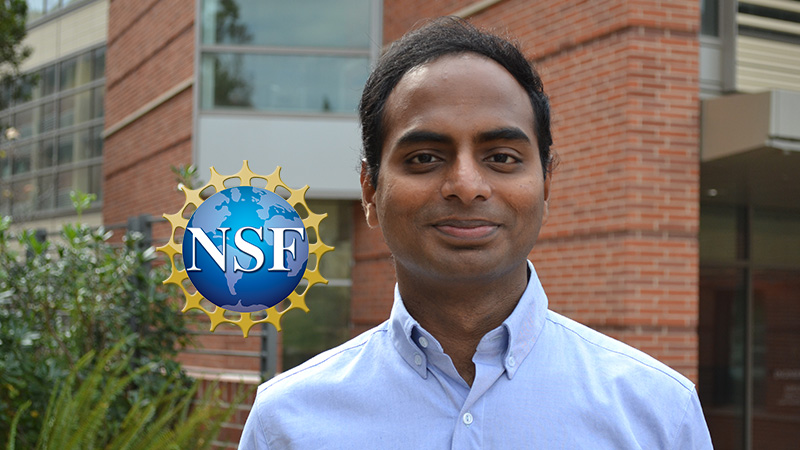UCLA Part of New $10M NSF Data Science Research Center, EnCORE

Associate Professor Raghu Meka will lead UCLA’s efforts in the NSF-funded research institute.
UCLA will be part of a multi-institutional research center funded by the National Science Foundation (NSF). The Institute for Emerging CORE Methods in Data Science, or EnCORE, will be a collaboration among UC San Diego (lead organization), UCLA, University of Pennsylvania and the University of Texas at Austin.
The NSF announced EnCORE last Friday as one of its two new Transdisciplinary Research in Principles of Data Science Phase II (TRIPODS) awards totaling $20 million. EnCORE will be the first of its kind headquartered in Southern California, closing a longstanding gap in a region with immense talent in science, technology, engineering and mathematics. With the new awards, there are now four research institutes in the TRIPODS program.
UCLA’s research efforts will be led by Raghu Meka, an associate professor of computer science at the UCLA Samueli School of Engineering, who specializes in complexity and learning theory, as well as algorithm design. He will be joined by Alyson “Allie” Fletcher — a UCLA assistant professor of statistics with joint appointments in computer science, electrical and computer engineering and mathematics. Fletcher’s research interests include large-scale data analysis and optimization, as well as estimation of dynamical systems.
EnCORE, which was recently highlighted in Forbes along with other TRIPODS awardees, will aim to address four pillars of data science — CORE, which stands for complexities, optimization, responsible learning and education and engagement, respectively — and emerging tech breakthroughs designed to problem-solve challenges in the ever-expanding field. Funded by NSF with $10 million over five years, the institute brings together a multidisciplinary team of researchers, with expertise in statistics, mathematics, electrical engineering, theoretical computer science, machine learning, health science, among other fields.
The proliferation of data-driven decision-making, and its increased popularity, has fueled rapid emergence of data science as a new scientific discipline. The successful integration of data science is seen as a key enabler of future businesses, technologies and health care that can transform socioeconomics.
The field’s fast adoption, however, often comes with ad hoc implementation of techniques with suboptimal, and sometimes unfair and potentially harmful, results. This creates an urgent need to develop principled approaches to laying solid foundations and tackle real-world data that are highly complex with intricate structures, unprecedented scale, rapidly evolving characteristics and implicit biases.
Addressing these challenges requires a concerted effort across multiple scientific disciplines, including statistics for robust decision-making under uncertainty; mathematics and electrical engineering for enabling data-driven optimization beyond worst case; theoretical computer science and machine learning for new algorithmic paradigms to deal with dynamic and sensitive data in an ethical way; and basic sciences to bring the technical developments to the forefront of health sciences and society.
Along with its transformative research vision, EnCORE fosters a bold plan for broadening participation by engaging students of diverse backgrounds at all levels, from K-12 to postdocs and junior faculty. The project aims to impact a wide demography of students by offering collaborative courses across its partner universities and a flexible co-mentorship plan for truly multidisciplinary research.
To bring the fruit of theoretical development to practice, EnCORE will continuously work with industry partners, domain scientists, and will forge strong connections with other NSF data science research institutes across the nation.
